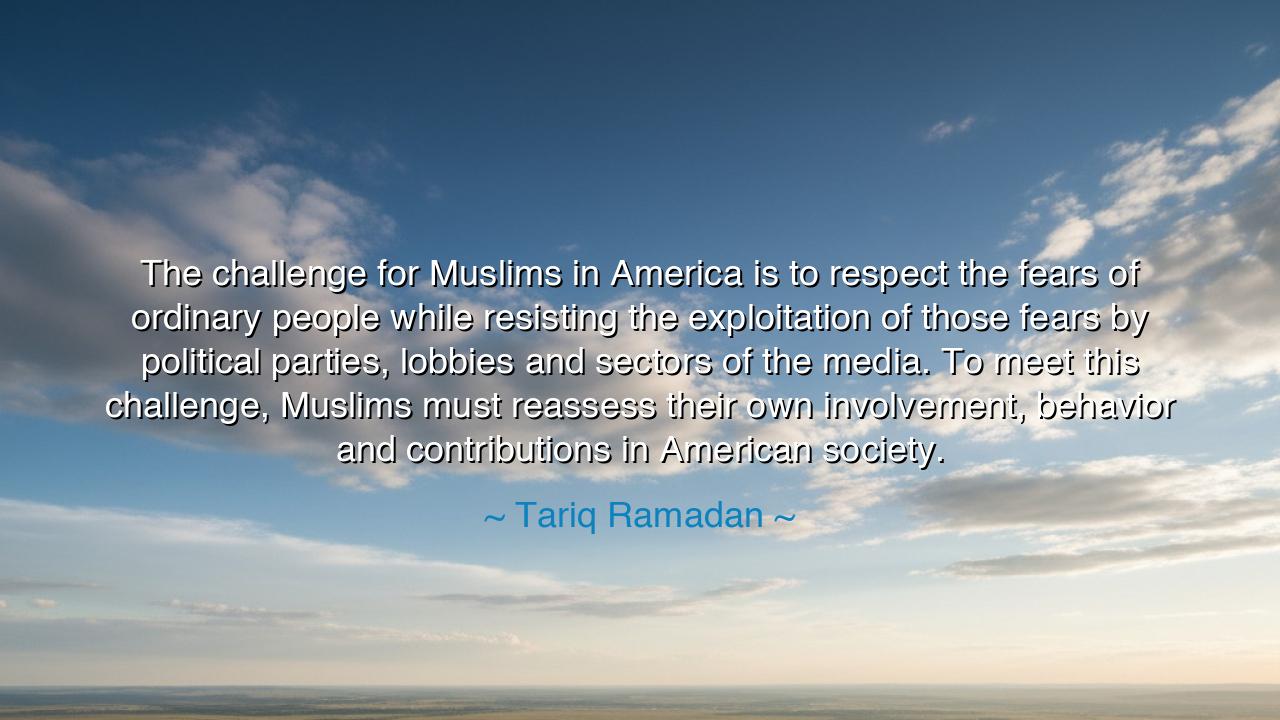
The challenge for Muslims in America is to respect the fears of
The challenge for Muslims in America is to respect the fears of ordinary people while resisting the exploitation of those fears by political parties, lobbies and sectors of the media. To meet this challenge, Muslims must reassess their own involvement, behavior and contributions in American society.






The words of Tariq Ramadan—“The challenge for Muslims in America is to respect the fears of ordinary people while resisting the exploitation of those fears by political parties, lobbies and sectors of the media. To meet this challenge, Muslims must reassess their own involvement, behavior and contributions in American society.”—are not mere commentary; they are a call to wisdom, patience, and courage. They remind us that to live as a community within a greater nation is to walk a delicate path: one must answer misunderstanding not with anger, but with clarity; one must answer exploitation not with despair, but with steadfast dignity.
The ancients taught that every society rests upon two pillars: trust and justice. When trust falters, fear rises; when justice weakens, exploitation thrives. Ramadan warns that Muslims in America face not only prejudice from without but the greater test of how they will respond from within. To respect the fears of ordinary people is to acknowledge that fear often grows from ignorance, from stories half-told, from shadows mistaken for threats. Respect does not mean submission to lies, but rather patience with those who do not yet see clearly. This is the discipline of wisdom: to answer fear with understanding, not with fury.
At the same time, the words speak of resisting the exploitation of fear. For history shows us that there are always voices—politicians hungry for power, lobbies eager for influence, media seeking profit—that will seize upon fear as a weapon. The story of Japanese Americans in World War II reveals this grim truth. Though most were loyal citizens, fear was exploited by politicians and the press until they were unjustly cast into internment camps. This example is a mirror of what can happen when fear is inflamed instead of healed. Ramadan’s warning is therefore timeless: vigilance must be kept, for fear in the hands of the powerful can become an instrument of great injustice.
The call to reassess involvement, behavior, and contributions is not a rebuke but an invitation. It is a reminder that every community must look inward as well as outward, asking: how do we present ourselves? How do we serve the greater good? How do we contribute not only to our own survival but to the flourishing of all? This is not a burden unique to Muslims; it is the universal duty of every group that lives within a larger whole. The Greeks called it arete—excellence in both private virtue and public service. When communities embody excellence, they disarm prejudice not by argument alone, but by example.
To live this teaching requires courage. It is easy to fall into defensiveness when one is misunderstood, easy to retreat into isolation when one is treated unjustly. Yet Ramadan calls for the harder path: engagement. He calls for Muslims to remain present, visible, contributing, to transform perception not through debate alone but through daily acts of neighborliness, service, and integrity. In this way, they become not strangers in the land, but essential threads in the fabric of society.
The lesson is clear: fear can divide, but respect can heal; exploitation can destroy, but contribution can rebuild. Each of us, Muslim or not, must learn to answer fear with patience and exploitation with resistance. We must strive to live as contributors, not merely dwellers, in the societies to which we belong. For when every group commits to serving the whole, prejudice loses its foothold, and justice takes root.
Practical actions shine before us: listen to the fears of others with empathy, but do not bow to those who would exploit them. Build bridges of understanding through honest conversation and shared labor. Live with integrity so that your life itself becomes testimony against prejudice. And most of all, contribute to the common good—through education, service, art, or kindness—so that your presence enriches the society around you. In this way, you honor yourself, your community, and the nation you call home.
So let us hear Tariq Ramadan’s wisdom as a charge to all generations: to respect, to resist, to reassess, and to contribute. These are not merely tasks for Muslims in America, but for all who dwell in diverse nations. For when fear is met with respect, when exploitation is denied power, and when contributions flow freely from every community, then a nation may truly call itself just, and its people may walk together in dignity.






AAdministratorAdministrator
Welcome, honored guests. Please leave a comment, we will respond soon